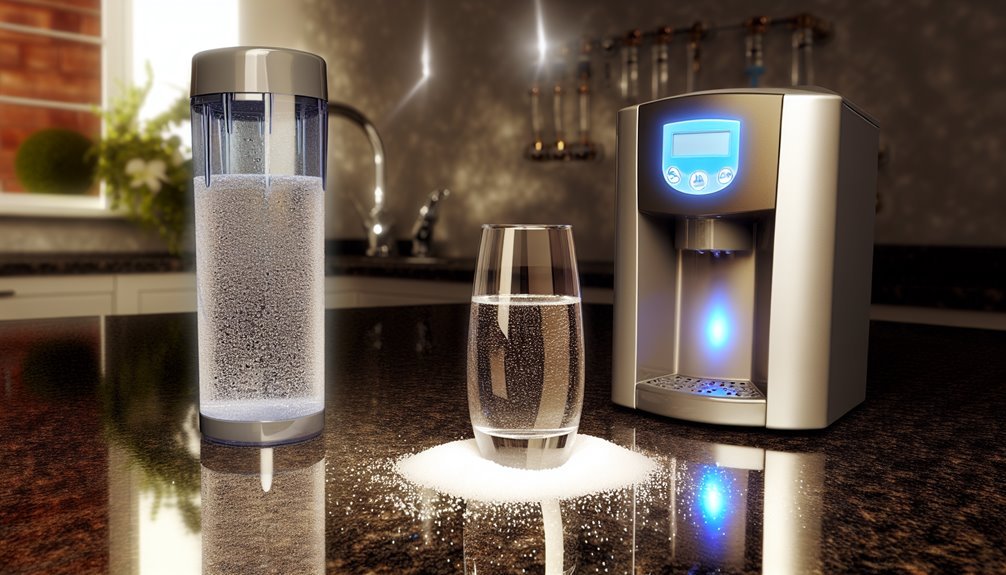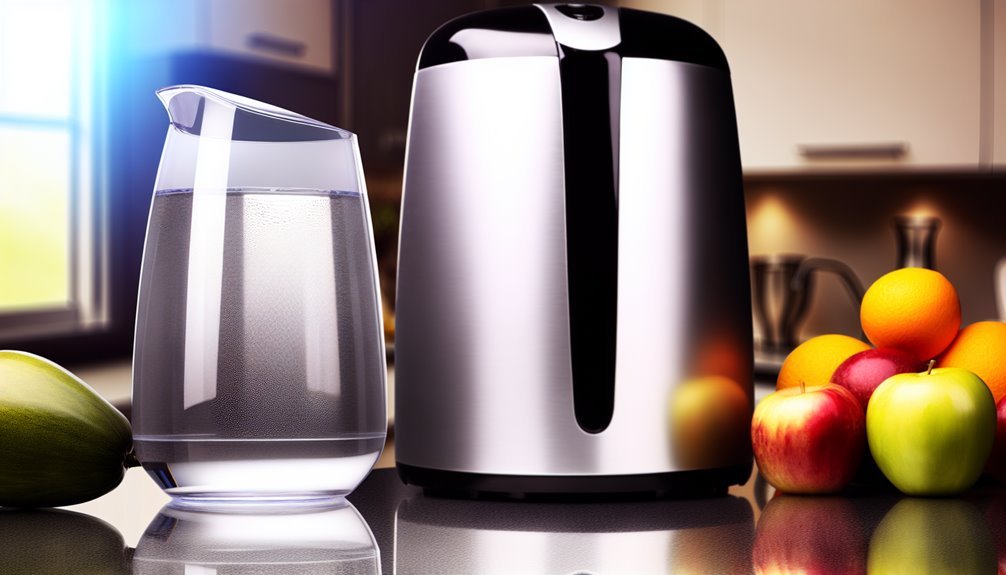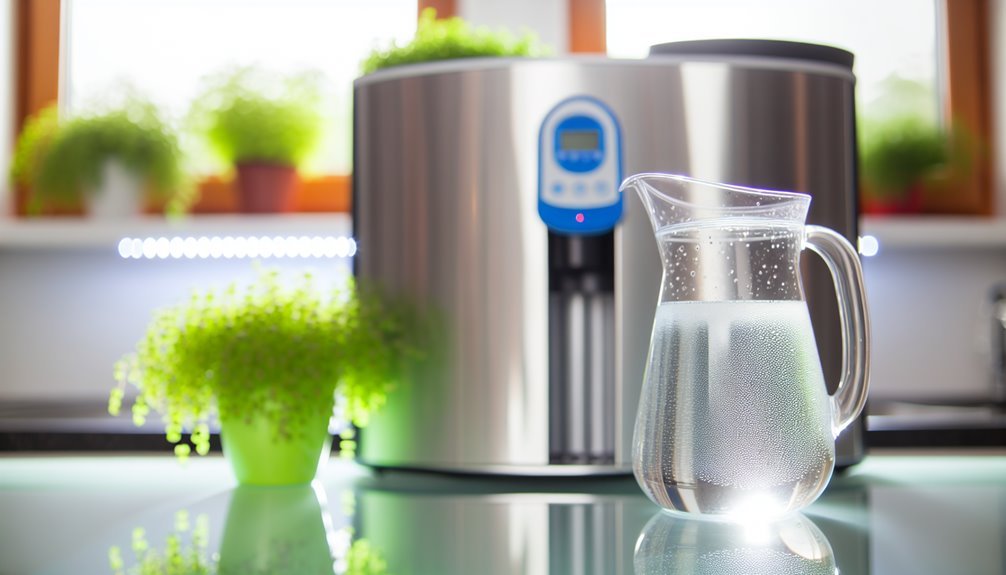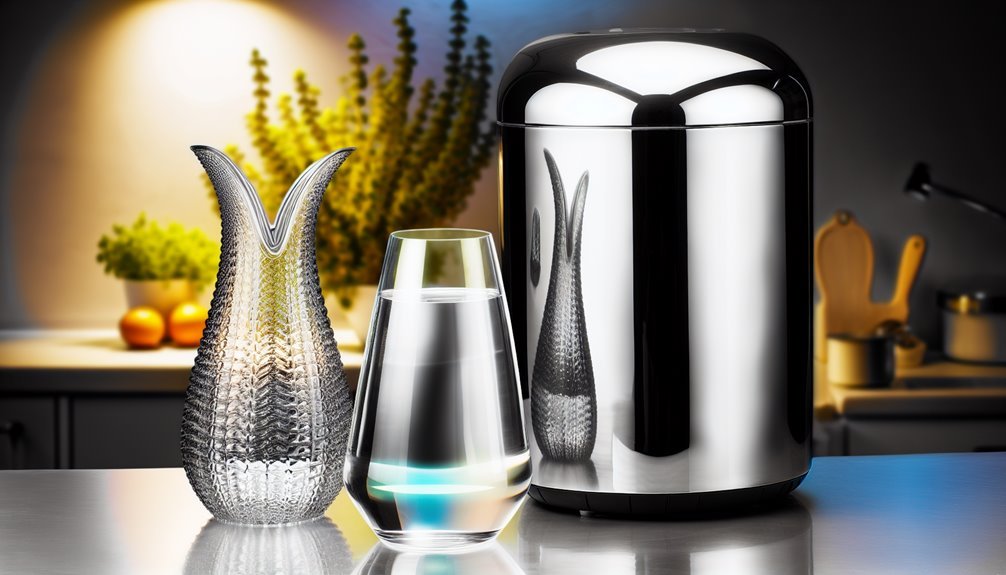If you're considering using Brita filters alongside a water softener, you might be curious about how these two systems interact and what that means for your water quality. While a water softener tackles hard minerals like calcium and magnesium, Brita filters focus on removing impurities and improving taste. However, the combination isn't without its nuances, especially regarding filter lifespan and performance. So, how do these factors influence your overall hydration experience? Let's explore the intricate relationship between these two systems and what you should know to maximize their benefits.
Key Takeaways
- Brita filters can be used effectively with water softeners to improve overall water quality and taste.
- Water softeners reduce hard minerals, while Brita filters remove contaminants, enhancing drinking water safety.
- Softened water may affect Brita filter taste, resulting in a less crisp or slightly salty flavor.
- Regular maintenance of both systems is essential for optimal performance and consistent water quality.
- Using both systems together promotes better hydration and long-term health benefits by reducing harmful contaminants.
Understanding Brita Filters
When it comes to your home's water quality, Brita filters are a popular choice for many households. They come in various filter types, such as pitcher filters, faucet-mounted filters, and bottle filters, each designed to meet your specific needs.
Understanding the filtration process of these filters is vital to ensuring you get the best drinking water possible. Brita filters primarily use activated carbon and ion exchange resin to remove impurities. The activated carbon absorbs contaminants like chlorine, while the ion exchange resin helps reduce heavy metals such as lead.
As water flows through the filter, these materials work together, effectively purifying your drinking water.
It's essential to replace your Brita filter regularly, typically every two months or after filtering around 40 gallons, to maintain peak performance. You can easily track the filter life through the built-in indicators in many Brita products.
What Is a Water Softener?
Water quality isn't just about the drinking water you consume; it also includes the water you use for washing, cooking, and bathing. A water softener is a system designed to improve this quality by reducing hardness in your water. Hard water contains high levels of minerals, like calcium and magnesium, which can cause scale buildup in pipes and appliances. This is where softening agents come into play.
When you install a water softener, it typically uses these agents—usually sodium or potassium—to replace the hard minerals through a process called ion exchange. As the hard water flows through the softener, the softening agents attach to the minerals, effectively removing them from your water supply.
This results in softer water that's easier on your skin, appliances, and laundry. Not only does this enhance your overall water quality, but it can also prolong the life of your household devices.
How Water Softeners Work

A water softener operates through a straightforward process called ion exchange, which effectively transforms hard water into soft water. In your home, hard water contains high levels of minerals like calcium and magnesium, making it less ideal for various tasks, such as cleaning and cooking.
When you install a water softener, it's filled with resin beads that are charged with sodium ions. As hard water flows through the system, these beads attract and bind the calcium and magnesium ions, effectively removing them from the water.
As the trapped minerals accumulate on the beads, the soft water that exits the system is now free of the hardness that once plagued your plumbing and appliances.
Eventually, the resin beads become saturated with the hardness ions, and that's when the softener regenerates. During this regeneration process, a salt solution flushes through the beads, replacing the accumulated calcium and magnesium with fresh sodium ions.
This cycle allows you to continue enjoying soft water, which not only improves your quality of life but also extends the lifespan of your appliances.
Ultimately, understanding how water softeners work empowers you to make informed decisions about your water quality.
Effects on Water Quality
When you use Brita filters and water softeners, you might notice some interesting changes in your water quality.
The mineral composition can shift, which not only affects how your water tastes but also its odor.
Plus, understanding how these systems impact filter lifespan is essential for ensuring you're always drinking the best quality water possible.
Mineral Composition Changes
Changes in mineral composition can greatly affect water quality, impacting both taste and health. When you use a water softener, it typically reduces the concentration of hard minerals like calcium and magnesium, which can lead to significant differences in your filtered water.
The Brita filter's filtration efficiency may be altered, as it's designed to target specific contaminants rather than the minerals that a softener modifies.
With mineral retention affected, you might notice your water tastes different—perhaps less crisp or even slightly salty. While soft water can feel smoother and easier on appliances, the lack of certain minerals can lead to a less desirable drinking experience.
Additionally, crucial minerals play a role in your overall health; their absence could impact your daily nutrient intake.
Ultimately, understanding how mineral composition changes can guide your choices when it comes to filtering your water. If you're relying on both a Brita filter and a water softener, it's important to reflect on how these systems interact and the implications for the quality of your drinking water.
Filter Lifespan Impact
Understanding how mineral composition affects your water quality also highlights the significance of filter lifespan. When you use a water softener, the mineral content in your water changes, which can impact your Brita filter's efficiency.
Over time, the presence of softened water can lead to a lifespan reduction of your filter. This reduction means that your filter may not work as effectively, allowing impurities to slip through.
If you notice a decline in filter performance, it's essential to replace it regularly. A filter that's past its prime can't remove contaminants as effectively, which may lead to lower water quality. You might think you're drinking clean water, but a worn-out filter may miss harmful substances, putting you at risk.
To make sure your drinking water remains safe and tasty, keep an eye on your filter's lifespan. Regularly replacing your filter not only maintains its efficiency but also helps guarantee that the water you consume continues to meet your quality standards.
Taste and Odor Variations
Many people notice that the taste and odor of their water can vary considerably, especially when using a Brita filter alongside a water softener. When you combine these two systems, you're likely to experience both taste enhancement and odor reduction.
The water softener works by removing minerals like calcium and magnesium, which can contribute to hard water's unpleasant taste and smell. This process makes your water smoother and more palatable.
However, it's crucial to understand that while a water softener improves taste, it can also introduce sodium into your water, which might alter the flavor.
This is where your Brita filter comes into play. It's designed to remove chlorine and other impurities that can lead to unpleasant odors. By filtering your water after softening, you can achieve a clean, fresh taste that's enjoyable to drink.
Compatibility of Brita Filters

When considering the compatibility of Brita filters, it's vital to know which systems and water types they work best with. Brita filters are primarily designed for use with municipal water supplies, where water hardness can vary considerably. Understanding your water hardness is essential, as it affects how well your filter performs.
Here's a quick overview of Brita filter compatibility based on filter types and water hardness:
| Filter Type | Compatibility with Water Hardness |
|---|---|
| Standard Filters | Works well with soft to moderate hardness |
| Longlast Filters | Best for soft to hard water |
| Faucet Filters | Effective for soft to moderate hardness |
| Pitcher Filters | Ideal for soft water |
Advantages of Using Both
Combining Brita filters with a water softener can greatly enhance your water quality. When you use both systems, you improve not just the taste and clarity of your water but also its overall safety.
Brita filters effectively remove impurities and contaminants, while water softeners reduce hard minerals like calcium and magnesium. This combination means you're drinking cleaner water, which brings numerous health benefits. Better hydration can lead to improved skin health and overall well-being.
Moreover, using both systems can have a positive environmental impact. By filtering your water, you're reducing the need for bottled water, which helps decrease plastic waste.
Softened water can also enhance the efficiency of your appliances, reducing energy consumption and prolonging their lifespan. So, when you invest in both a Brita filter and a water softener, you're making a choice that benefits both your health and the planet.
Best Practices for Use

When using Brita filters and a water softener, it's important to take into account compatibility to guarantee you're getting the best performance from both systems.
Regular maintenance and timely replacement of filters will keep your water tasting fresh and your softener running smoothly.
Plus, adjusting the settings on your water softener can optimize your home's water quality, making it more enjoyable for drinking and daily use.
Filter Compatibility Considerations
Verifying filter compatibility is fundamental for maximizing the effectiveness of your Brita system. When you choose a Brita filter, it's vital to take into account the filter types designed specifically for your water pitcher or faucet. Not every filter works with every model, so doing your compatibility checks can save you time and money.
Before purchasing a filter, read the packaging or consult the Brita website to confirm that it's intended for your particular system. Using a non-compatible filter can lead to subpar filtration, reducing the quality of your drinking water. You might be tempted to experiment with different filters, but remember that not all options are created equal.
If you have a water softener, be aware that the mineral content in softened water can impact how well certain filters perform. Some Brita filters are optimized for specific water conditions, so selecting the right one guarantees you're getting the best results.
Finally, keep an eye on the expiration date of your filters; even compatible ones can lose effectiveness over time. By following these best practices, you'll enhance your drinking water experience and enjoy fresh, clean hydration.
Maintenance and Replacement Tips
Maintaining your Brita system is key to guaranteeing you consistently enjoy clean, great-tasting water. Regular filter maintenance is essential not just for taste but also for your health. To keep your system running smoothly, pay attention to the replacement frequency of your filters. Here's a handy table to help you track your maintenance routine:
| Filter Type | Replacement Frequency |
|---|---|
| Standard Filter | Every 40 gallons |
| Longlast Filter | Every 120 gallons |
| Pitcher Filter | Every 40 gallons |
| Faucet Filter | Every 100 gallons |
These guidelines can vary based on your water quality, so be vigilant about checking your filters. You might also want to mark your calendar for replacements or set reminders on your phone. If your water starts to taste different or flow slows down, it's a sign to replace the filter. By staying proactive with your Brita system, you'll guarantee that every glass of water is invigorating and safe to drink. Remember, consistent maintenance leads to consistently great results!
Optimal Water Softener Settings
Finding the right settings for your water softener can greatly enhance your home's water quality. To achieve ideal settings, you'll first need to determine your water hardness level. Most water softeners come with a hardness scale, so check your local water report or use a testing kit. Once you know the hardness, you can adjust the softener's settings accordingly.
Typically, for soft water, you'll want to set your water softener to regenerate based on your household's water usage. This usually involves programming the unit to regenerate after a specific number of gallons have been used. If your household consumes a lot of water, consider a shorter regeneration cycle, while smaller families can stretch it out.
Moreover, monitor your salt levels regularly to guarantee efficient performance. Too little salt can lead to ineffective softening, while too much can create sludge in the brine tank.
By keeping an eye on these factors and adjusting your settings when necessary, you'll enjoy the benefits of soft water, which can improve everything from your skin to your appliances.
Frequently Asked Questions
Can I Use Brita Filters Without a Water Softener?
Yes, you can use Brita filters without a water softener. Doing so may impact water quality, but it shouldn't drastically affect filter longevity. Just remember to change the filter regularly for ideal performance.
How Often Should I Replace My Brita Filter?
You should replace your Brita filter every 40 gallons or roughly every two months, depending on your water quality. Keeping track of your filter's lifespan guarantees you maintain ideal water taste and safety.
Do Brita Filters Remove Sodium From Softened Water?
Brita filters aren't designed for sodium removal from softened water. They primarily target contaminants like chlorine and sediment. If sodium's a concern, consider using a reverse osmosis system for effective removal alongside your Brita filter.
Are Brita Filters Effective for Hard Water?
Brita filters can improve your water's taste and odor but may struggle with hard water effects like scale buildup. You might notice reduced filter performance over time, so consider alternatives if hardness is a significant issue.
Can I Use Hot Water With Brita Filters?
Imagine pouring steaming tea into a delicate cup; using hot water with Brita filters can shorten filter lifespan. Hot water effects may compromise effectiveness, so stick to cold or room temperature for best results.
Conclusion
Incorporating Brita filters with a water softener isn't just smart; it's like turning your kitchen sink into a five-star hydration station! Together, they obliterate impurities and banish hard water woes, resulting in invigoratingly clean, delicious water that can elevate your health to stratospheric levels. Just remember to replace those Brita filters regularly, or you might find yourself back in the domain of mediocre hydration. So, embrace this dynamic duo and sip your way to a tastier life!

